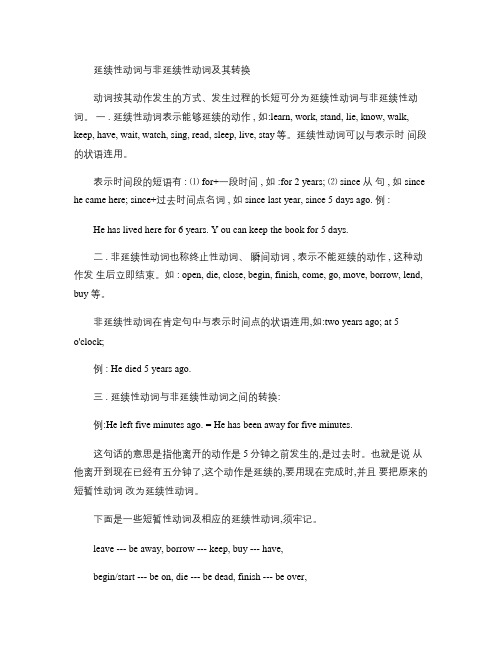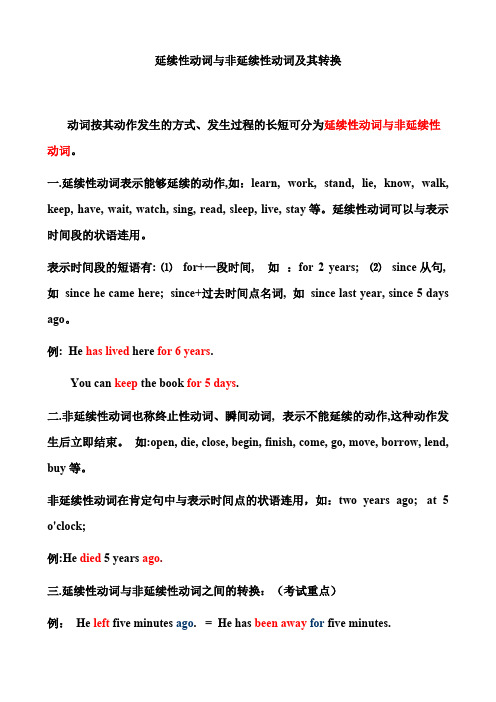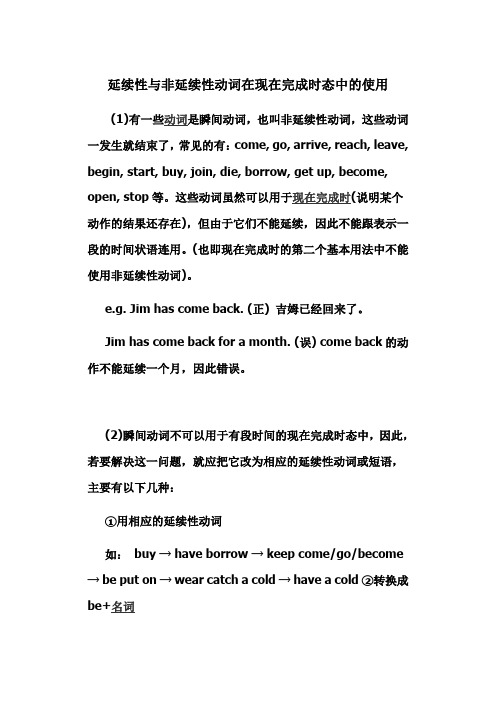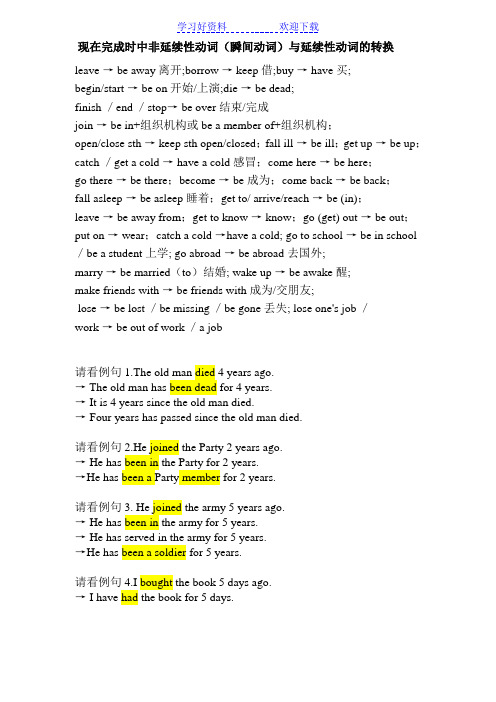延续性动词与非延续性动词在现在完成时中的运用
- 格式:ppt
- 大小:112.00 KB
- 文档页数:19

延续性动词与非延续性动词及其转换动词按其动作发生的方式、发生过程的长短可分为延续性动词与非延续性动词。
一. 延续性动词表示能够延续的动作,如:learn, work, stand,lie, know,walk, keep, have, wait, watch,sing, read, sleep,live,stay等。
延续性动词可以与表示时间段的状语连用。
表示时间段的短语有:⑴for+一段时间, 如:for 2 years;⑵since 从句,如since he came here;since+过去时间点名词,如since last year,since 5 days ago。
例:He has lived here for 6 years。
You can keep the book for 5 days。
二. 非延续性动词也称终止性动词、瞬间动词,表示不能延续的动作,这种动作发生后立即结束.如: open, die, close, begin, finish, come,go, move, borrow, lend, buy等。
非延续性动词在肯定句中与表示时间点的状语连用,如:two years ago; at 5 o’clock;例:He died 5 years ago.三.延续性动词与非延续性动词之间的转换:例:He left five minutes ago. = He has been away for five minutes.这句话的意思是指他离开的动作是5分钟之前发生的,是过去时。
也就是说从他离开到现在已经有五分钟了,这个动作是延续的,要用现在完成时,并且要把原来的短暂性动词改为延续性动词.下面是一些短暂性动词及相应的延续性动词,须牢记。
leave -—— be away, borrow ——— keep, buy -—- have,begin/start -—- be on,die -—— be dead,finish -—— be over,join --—be in+组织机构, be a member of+组织机构,open sth —-- keep sth open,fall ill ——- be ill, get up--—be up,catch a cold —-- have a cold, come here —-— be here,go there —-- be there,become —-— be, come back —-- be back,fall asleep —-- be asleep, get to/ arrive/reach —-- be (in),leave --- be away from,get to know -—- know,go (get) out →be out, put on→wear;catch a cold →have a cold等. 练习:1。

延续性动词与非延续性动词及其转换动词按其动作发生的方式、发生过程的长短可分为延续性动词与非延续性动词。
一. 延续性动词表示能够延续的动作,如:learn, work, stand, lie, know, walk, keep, have, wait, watch, sing, read, sleep, live, stay等。
延续性动词可以与表示时间段的状语连用。
表示时间段的短语有: ⑴for+一段时间, 如:for 2 years; ⑵since从句, 如since he came here; since+过去时间点名词, 如since last year, since 5 days ago. 例:He has lived here for 6 years. You can keep the book for 5 days.二. 非延续性动词也称终止性动词、瞬间动词, 表示不能延续的动作,这种动作发生后立即结束。
如: open, die, close, begin, finish, come, go, move, borrow, lend, buy等。
非延续性动词在肯定句中与表示时间点的状语连用,如:two years ago; at 5 o'clock;例: He died 5 years ago.三.延续性动词与非延续性动词之间的转换:例:He left five minutes ago. = He has been away for five minutes.这句话的意思是指他离开的动作是5分钟之前发生的,是过去时。
也就是说从他离开到现在已经有五分钟了,这个动作是延续的,要用现在完成时,并且要把原来的短暂性动词改为延续性动词。
下面是一些短暂性动词及相应的延续性动词,须牢记。
leave --- be away, borrow --- keep, buy --- have,begin/start --- be on, die --- be dead, finish --- be over,join --- be in+组织机构, be a member of+组织机构,open sth --- keep sth open, fall ill --- be ill, get up---be up,catch a cold --- have a cold, come here --- be here,go there --- be there, become --- be, come back --- be back,fall asleep --- be asleep, get to/ arrive/reach --- be (in),leave --- be away from, get to know --- know,go (get) out →be out,put on→wear;catch a cold →have a cold等。



延续性与非延续性动词在现在完成时态中的使用
延续性动词和非延续性动词在现在完成时态中的使用有一些区别。
1.延续性动词:
延续性动词表示持续的动作或状态,常见的有live(住)、work
(工作)、study(学习)、wait(等待)等。
在现在完成时态中,延续
性动词通常用来表示一个动作或状态开始于过去,持续到现在,并且可能
会继续下去。
例如:
- I have lived in this city for 10 years.(我在这个城市住了
10年了。
)
2.非延续性动词:
非延续性动词表示瞬间动作或不可数的状态,常见的有arrive(到达)、die(死亡)、finish(完成)、know(知道)等。
在现在完成时
态中,非延续性动词通常用来表示一个动作已经完成或一个状态已经发生,没有持续的时间。
例如:
- She has arrived at the airport.(她已经到达了机场。
)
- The project has finished.(项目已经完成了。
)
- I have known him since childhood.(我从小就认识他了。
)
需要注意的是,有些动词既可以是延续性动词,也可以是非延续性动词,根据上下文来决定其使用方式。
比如,动词sleep(睡觉)可以是延
续性动词,表示持续的睡眠状态,也可以是非延续性动词,表示一次性的睡眠动作。

延续性动词与非延续性动词及其转换动词按其动作发生的方式、发生过程的长短可分为延续性动词与非延续性动词。
一 . 延续性动词表示能够延续的动作 , 如:learn, work, stand, lie, know, walk, keep, have, wait, watch, sing, read, sleep, live, stay等。
延续性动词可以与表示时间段的状语连用。
表示时间段的短语有 : ⑴ for+一段时间 , 如 :for 2 years; ⑵ since 从句 , 如 since he came here; since+过去时间点名词 , 如 since last year, since 5 days ago. 例 :He has lived here for 6 years. Y ou can keep the book for 5 days.二 . 非延续性动词也称终止性动词、瞬间动词 , 表示不能延续的动作 , 这种动作发生后立即结束。
如 : open, die, close, begin, finish, come, go, move, borrow, lend, buy 等。
非延续性动词在肯定句中与表示时间点的状语连用,如:two years ago; at 5o'clock;例 : He died 5 years ago.三 . 延续性动词与非延续性动词之间的转换:例:He left five minutes ago. = He has been away for five minutes.这句话的意思是指他离开的动作是 5分钟之前发生的,是过去时。
也就是说从他离开到现在已经有五分钟了,这个动作是延续的,要用现在完成时,并且要把原来的短暂性动词改为延续性动词。
下面是一些短暂性动词及相应的延续性动词,须牢记。
leave --- be away, borrow --- keep, buy --- have,begin/start --- be on, die --- be dead, finish --- be over,join --- be in+组织机构 , be a member of+组织机构 ,open sth --- keep sth open, fall ill --- be ill, get up---be up,catch a cold --- have a cold, come here --- be here,go there --- be there, become --- be, come back --- be back,fall asleep --- be asleep, get to/ arrive/reach --- be (in,leave --- be away from, get to know --- know,go (get out → be out, put on→ wear ; catch a cold → have a cold等。

延续性动词与非延续性动词及其转换动词按其动作发生的方式、发生过程的长短可分为延续性动词与非延续性动词。
一.延续性动词表示能够延续的动作,如:learn, work, stand, lie, know, walk, keep, have, wait, watch, sing, read, sleep, live, stay等。
延续性动词可以与表示时间段的状语连用。
表示时间段的短语有: ⑴for+一段时间, 如:for 2 years; ⑵since从句, 如since he came here; since+过去时间点名词, 如since last year, since 5 days ago。
例: He has lived here for 6 years.You can keep the book for 5 days.二.非延续性动词也称终止性动词、瞬间动词, 表示不能延续的动作,这种动作发生后立即结束。
如:open, die, close, begin, finish, come, go, move, borrow, lend, buy等。
非延续性动词在肯定句中与表示时间点的状语连用,如:two years ago; at 5 o'clock;例:He died 5 years ago.三.延续性动词与非延续性动词之间的转换:(考试重点)例:He left five minutes ago. = He has been away for five minutes.这句话的意思是指他离开的动作是5分钟之前发生的,是过去时。
也就是说从他离开到现在已经有五分钟了,这个动作是延续的,要用现在完成时,并且要把原来的短暂性动词改为延续性动词。
一些短暂性动词及相应的延续性动词:arrive(get to /reach)→ be here (in)begin(start) → be ondie → be deadcome here(back)→be here(back)leave → be away (from)fall ill(sick, asleep)→be ill(sick, asleep)get up→ be upgo/ get out(there)→ be out(there)finish → be overput on → wear 或be onopen → be open(keep sth. open)join → be in或be a member of…+组织机构close → be closedgo to school → be a studentborrow →keepbuy/get →havecatch(a cold) → have(a cold)get to know → know begin to study → study come to work → work move to → live in finish → be over come to → be insit down → be seated marry → be married dress → be dressed become → be。

现在完成时中延续性动词和非延续性动词延续性动词study learn sleep live sing dance swim drink teach keep非延续性动词:buy borrow lend die leave begin come / go 非延续性动词不能和how long ; for ….since…连用要把它们变成其他相应的词.(买了…)have/has had…(借了…)have/has kept …(开始了…)have /has been on(离开了…)have /has been away (from)..(来到某地/ 去某地….)have /has been in …(死了…)have/has been dead1.我买这本书三年了。
(1).I bought the book three years ago.(2) I have had the book for 3 years.(3) I have had the book since 3 years ago.How long have you had the book2.他借这本书两个月了(1)He borrowed the book two months ago.(2)He has kept the book for 2 months .(3) He has kept the book since 2 months ago.How long has he kept the book3.李梅离开济南一年了.(1) Li Mei left Jinan one year ago.(2) Li Mei has been away from Jinan for one year.(3) Li Mei has been away from Jinan since 1 year ago.How long has Li Mei been away from Jinan4. 会议开始20分钟了。


现在完成时中延续性动词和非延续性动词延续性动词study learn sleep live sing dance swim drink teach keep非延续性动词:buy borrow lend die leave begin come / go非延续性动词不能和how long ; for ….since…连用要把它们变成其他相应的词.(买了…)have/has had…(借了…)have/has kept …(开始了…)have /has been on(离开了…)have /has been away (from)..(来到某地/ 去某地….)have /has been in …(死了…)have/has been dead1.我买这本书三年了。
(1).I bought the book three years ago.(2) I have had the book for 3 years.(3) I have had the book since 3 years ago.How long have you had the book ?2.他借这本书两个月了(1)He borrowed the book two months ago.(2)He has kept the book for 2 months .(3) He has kept the book since 2 months ago.How long has he kept the book?3.李梅离开济南一年了.(1) Li Mei left Jinan one year ago.(2) Li Mei has been away from Jinan for one year.(3) Li Mei has been away from Jinan since 1 year ago.How long has Li Mei been away from Jinan?4. 会议开始20分钟了。

延续性与非延续性动词在现在完成时态中的使用一发生就结束了,常见的有:come, go, arrive, reach, leave, begin, start, buy, join, die, borrow, get up, become,动作的结果还存在),但由于它们不能延续,因此不能跟表示一段的时间状语连用。
(也即现在完成时的第二个基本用法中不能使用非延续性动词)。
e.g. Jim has come back. (正) 吉姆已经回来了。
Jim has come back for a month. (误) come back的动作不能延续一个月,因此错误。
(2)瞬间动词不可以用于有段时间的现在完成时态中,因此,若要解决这一问题,就应把它改为相应的延续性动词或短语,主要有以下几种:①用相应的延续性动词如:buy → have borrow → keep come/go/become → be put on → wear catch a cold → have a cold ②转换成如:join → be a member of go to school → be a如:die → be dead leave → be away begin → be on finish → be over fall asleep — be asleep open → be语如:come to/go to/arrive in (at)/get to/reach …→be in/at… join the army → be in the army(军队)e.g. I have borrowed the book. 我已经借了那本书。
I have kept the book for two days. 我已经借那本书两天了。
Jim has joined the band. 吉姆已经加入那乐队了。
Jim has been a member of the band for a month. 吉姆已经加入那个乐队一个月了。

现在完成时中非延续性动词(瞬间动词)与延续性动词的转换leave → be away离开;borrow → keep借;buy → have买;begin/start → be on开始/上演;die → be dead;finish /end /stop→ be over结束/完成join → be in+组织机构或be a member of+组织机构;open/close sth → keep sth open/closed;fall ill → be ill;get up → be up;catch /get a cold → have a cold感冒;come here → be here;go there → be there;become → be成为;come back → be back;fall asleep → be asleep睡着;get to/ arrive/reach → be (in);leave → be away from;get to know → know;go (get) out → be out;put on → wear;catch a cold →have a cold; go to school → be in school /be a student上学; go abroad → be abroad去国外;marry → be married(to)结婚; wake up → be awake 醒;make friends with → be friends with成为/交朋友;lose → be lost /be missing /be gone 丢失; lose one's job /work → be out of work /a job请看例句1.The old man died 4 years ago.→ The old man has been dead for 4 years.→ It is 4 years since the old man died.→ Four years has passed since the old man died.请看例句2.He joined the Party 2 years ago.→ He has been in the Party for 2 years.→He has been a Party member for 2 years.请看例句3. He joined the army 5 years ago.→ He has been in the army for 5 years.→ He has served in the army for 5 years.→He has been a soldier for 5 years.请看例句4.I bought the book 5 days ago.→ I have had the book for 5 days.。

延续性动词与非延续性动词用法攻略一、延续性动词和非延续性动词的概念英语中,动词按其动作发生的方式、动作发生过程的长短,可分为延续性动词和非延续性动词。
延续性动词表示能够延续的动作,这种动作可以延续下去或产生持久影响。
此类动词常见的如:learn, work, stand, lie, know, walk, keep, have, wait, watch, sing, read, sleep, live, stay等。
非延续性动词也称终止性动词、瞬间动词或短暂性动词,表示不能延续的动作,这种动作发生后立即结束。
此类动词常见的如open, close, finish, begin, come, go, arrive, reach, get to, leave, move, borrow, buy等。
二、延续性动词的用法特征1.延续性动词可以用于现在完成时,其完成时态可与表示“段时间”的状语连用。
表示“段时间”的短语有:for two years, during the past three years, since接时间点或从句, how long等。
如:He has lived here for 6 years.他在这儿已住了六年了。
I have learned English since I came here.自从我来到这儿就学英语了。
2.延续性动词不能与“点时间”状语连用。
试比较:误:It rained at eight yesterday morning.正:It began to rain at eight yesterday morning.析:rain为延续性动词,而at eight表示“点时间”,前后显然矛盾。
如果用延续性动词表示一瞬间的动作,可以借助come, begin, get等非延续性动词来表示。
又如:--When did you get to know Jack?你什么时候认识杰克的?--Two years ago.两年前。

现在完成时的延续性动词与非延续性动词动词可分为延续性动词和非延续性动词(也称短暂性或瞬间动词),取决于动作发生的方式和过程的长短。
延续性动词可以与表示时间段的状语连用,如“for”加一段时间,比如“for2 years”,或者“since”加从句或过去时间点,比如“since he came here”或“since last year”、“since 5 days ago”。
非延续性动词表示不能延续的动作,一旦发生就立即结束。
在现在完成时的肯定句中,短暂性动词不能与表示时间段的“for”短语、since短语或从句连用,也不能与表示时间段的how long引起的疑问句连用。
例如,不能说“I have bought the book for 2 weeks”,而应该说“I have bought the book”,或者“I have had the book for two weeks”。
同样地,不能说“I have bought the book since twowee ks ago”或“I have bought the book two weeks ago”。
对于非延续性动词,可以使用其他方式表达。
比如,“The old man died 4 years ago”可以改为“The old man has been deadfor 4 years”、“It is/has been 4 years since the old man died”或“Four years has passed since the old man died”。
有时候,可以将短暂性动词转换为延续性动词。
例如,“go(to)/come(to)/XXX”可以改为“XXX”,“return/go back/come back”可以改为“be back”。
举个例子,可以说“XXX minutes ago”或“He has been in Beijing for ten minutes”;“My sister XXX”可以改为“My sister has been an engineer since 2005”。

延续性动词与非延续性动词及其转换动词按其动作发生的方式、发生过程的长短可分为延续性动词与非延续性动词。
一.延续性动词表示能够延续的动作,如:learn, work, stand, lie, know, walk, keep, have, wait, watch, sing, read, sleep, live, stay等。
延续性动词可以与表示时间段的状语连用。
表示时间段的短语有: ⑴for+一段时间, 如:for 2 years; ⑵since从句, 如since he came here; since+过去时间点名词, 如since last year, since 5 days ago。
例: He has lived here for 6 years.You can keep the book for 5 days.二.非延续性动词也称终止性动词、瞬间动词, 表示不能延续的动作,这种动作发生后立即结束。
如:open, die, close, begin, finish, come, go, move, borrow, lend, buy等。
非延续性动词在肯定句中与表示时间点的状语连用,如:two years ago; at 5 o'clock;例:He died 5 years ago.三.延续性动词与非延续性动词之间的转换:例:He left five minutes ago. = He has been away for five minutes.这句话的意思是指他离开的动作是5分钟之前发生的,是过去时。
也就是说从他离开到现在已经有五分钟了,这个动作是延续的,要用现在完成时,并且要把原来的短暂性动词改为延续性动词。
一些短暂性动词及相应的延续性动词:arrive(get to /reach)→ be here (in) begin(start) → be ondie → be deadcome here(back)→be here(back)leave → be away (from)fall ill(sick, asleep)→be ill(sick, asleep)get up→ be upgo/ get out(there)→ be out(there)finish → be overput on → wearopen → be open(join → be in或be a member of…+组织机构close → be closedgo to school → be a studentborrow →keepbuy/get →havecatch(a cold) → have(a cold)get to know → knowbegin to study → studycome to work → workmove to → live infinish/end → be overcome to → be inmarry → be marriedbecome → be。

